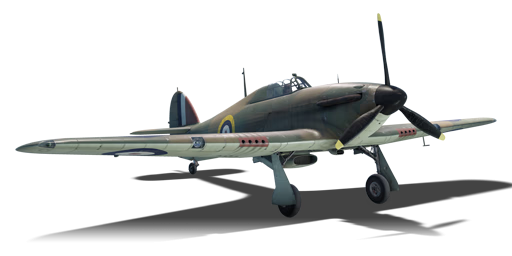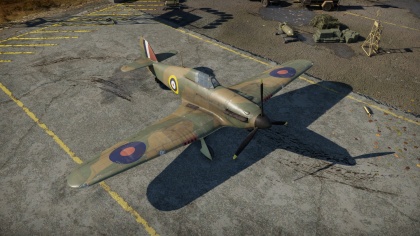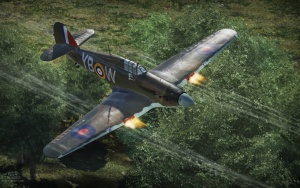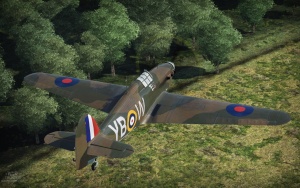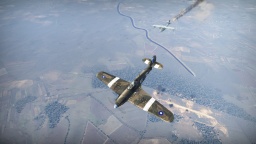Hurricane Mk I/L
Contents
| This page is about the British fighter Hurricane Mk I/L. For other versions, see Hurricane (Family). |
Description
The Hurricane Mk I Late is a rank II British fighter
with a battle rating of 2.7 (AB), 2.3 (RB), and 2.0 (SB). It has been in the game since the start of the Open Beta Test prior to Update 1.27.
The Hurricane Mk I/L is one of the first monoplane fighters you will come across within the British tree. The aircraft is powered by a Rolls-Royce Merlin III engine and comes equipped with eight Browning 7.7 mm machine guns, with four situated in each wing.
Whilst not quite as manoeuvrable or as fast as its Spitfire brethren, the Hurricane Mk I/L is still very agile for its rank and can hold its own very effectively in dogfights. One of the Hurricane's true strengths is in its durability and sheer robust nature which makes it a favourite among the virtual pilots of War Thunder as it was during the Battle of Britain almost 75 years ago. You will find your Hurricane able to withstand a very high amount of damage before it will give in as it is a largely fabric covered aircraft.
It is also a very stable gun platform which makes aiming and shooting a very easy task to do. In general the Hurricane is a joy to fly in all modes. A great and forgiving fighter aircraft for beginners to fly!
General info
Flight performance
Describe how the aircraft behaves in the air. Speed, manoeuvrability, acceleration and allowable loads - these are the most important characteristics of the vehicle.
| Characteristics | |||||||
|---|---|---|---|---|---|---|---|
| Stock | |||||||
| Max Speed (km/h at 3,962 m) |
Max altitude (meters) |
Turn time (seconds) |
Rate of climb (meters/second) |
Take-off run (meters) | |||
| AB | RB | AB | RB | AB | RB | ||
| 503 | 486 | 10700 | 15.9 | 16.4 | 7.4 | 7.4 | 350 |
| Upgraded | |||||||
| Max Speed (km/h at 3,962 m) |
Max altitude (meters) |
Turn time (seconds) |
Rate of climb (meters/second) |
Take-off run (meters) | |||
| AB | RB | AB | RB | AB | RB | ||
| 551 | 525 | 10700 | 14.7 | 15.0 | 16 | 10.9 | 350 |
Details
| Features | ||||
|---|---|---|---|---|
| Combat flaps | Take-off flaps | Landing flaps | Air brakes | Arrestor gear |
| ✓ | ✓ | ✓ | X | X |
| Limits | ||||
|---|---|---|---|---|
| Wing-break speed (km/h) |
Gear limit (km/h) |
Combat flaps (km/h) |
Max Static G | |
| + | - | |||
| 285 | ~12 | ~6 | ||
| Optimal velocities | |||
|---|---|---|---|
| Ailerons (km/h) |
Rudder (km/h) |
Elevators (km/h) |
Radiator (km/h) |
| < 370 | < 250 | < 380 | > 410 |
| Compressor (RB/SB) | ||
|---|---|---|
| Setting 1 | ||
| Optimal altitude | 100% Engine power | WEP Engine power |
| 4,953 m | 1,030 hp | 1,355 hp |
Survivability and armour
- 6.35 mm Steel - Armour plate in front of the control panel
- 12.7 mm Steel - Armour plate behind pilot seat/headrest
- 38 mm Bulletproof glass - Armoured windscreen
Armaments
Offensive armament
The Hurricane Mk I/L is armed with:
- 8 x 7.7 mm Browning .303 machine guns, wing-mounted (350 rpg = 2,800 total)
Usage in battles
The strong, sturdy wings on the Hurricane make for an excellent gun platform for pilots. So whilst it may lack the punch of cannons or heavier machine guns, you will find the Hurricane's agility and ability to put accurate fire on targets to be in your favour. The standard "Hawker" style wide track landing gear present on most, if not all of their monoplane fighters is, of course, found on the Hurricane Mk I/L as well, making this aircraft much more appealing to newer players when landing due to its stability.
In combat the Hurricane Mk I/L allows pilots to engage almost any aircraft comfortably. Many of the fighters you will face do not have the agility to outmanoeuvre the Hurricane, which will only be surpassed by any biplanes or Japanese fighters you may face. Lone fighter-bombers, attackers, heavy fighters and bombers should also present little threat to the Hurricane as its 8 machine guns provide a dense spread of fire at a fast rate, whilst the rigidity and durability of the airframe will cope with the return fire of the opposing aircrafts' gunners.
The Hurricane Mk.I have eight .303 calibre machine guns, four in each wing. However, unlike the Spitfire, the Hurricane's guns are all in a single group, so it provides a better firing platform than the Spitfire by allowing its firepower to be concentrated.
Hurricane's armament distribution:
[]
---IIII-[]-IIII---
[]
[]
----
Spitfire's armament distribution:
[]
-I-II-I-[]-I-II-I-
[]
[]
----
For Realistic and Simulator Battles, the rate of fire and the subsequent lack of ammo are an important issue to keep in mind. It is easy to deplete the entire ammo with a long burst. Trigger discipline is the key here! Furthermore, the Hurricane's heavy weight, due to its old-fashioned tube chassis (unlike the more modern Spitfire with its nutshell chassis design), results in good vertical energy retention, allowing the plane to perform Boom & Zoom manoeuvres with great success. Utilise them as the standard form of fighting in both modes, as unlike in Arcade, regaining energy and speed after a turn fight takes rather long, leaving you vulnerable to fighters who didn't join the conflict earlier.
Counter-tactics
Countering the Hurricane almost completely depends on what kind of plane you are flying. If you see a Hurricane there are three things to remember: It is extremely good at turning, very durable and it has 8 machine guns, which despite their small calibre are extremely deadly. It will be able to place you in its crosshairs very quickly and saturate you with rounds. The Hurricane Mk I/L is not without its weaknesses, however. It isn't particularly fast, doesn't dive very well and performs poorly at high altitude.
When countering the Hurricane, you must take these strengths and weaknesses into account and also your own. If your plane is faster than the Hurricane but does not turn as well, you should boom and zoom, diving on the Hurricane from altitude and strafing it as you speed by. In a successful attempt, you will destroy the Hurricane in one pass. However, if you miss or only cause minor damage you may need to make another pass. In no situation should you try to turn fight the Hurricane at this stage. You will bleed energy and it will easily out turn and destroy you. Instead, you should use the speed gained in the dive to climb away, leaving the Hurricane behind. When you have achieved an appropriate altitude and speed you can then turn back and make another pass. This kind of manoeuvre takes patience but is worth it when it comes to fighting the Hurricane. Impatience will only get you out-paced by the Hurricane and shot down. If you want to have a higher success rate with boom and zoom tactics, it is good to choose a well-armed plane. Something with cannons or high calibre machine guns should suffice. Planes like the Bf 109, MiG-3, LaGG-3-8, P-36G and even attackers like the IL-2 are effective at boom and zoom tactics on the Hurricane.
Some planes can also turn fight the Hurricane. Most biplanes should have equal or better turning capabilities than the Hurricane. An inexperienced/impatient Hurricane pilot may try to out turn a biplane, usually resulting in disaster. However, biplanes are slower. They will often find experienced Hurricane pilots performing tactics like the above-mentioned boom and zoom where the Hurricane can use its higher speed to climb away after a pass. There are also some monoplanes that can out turn a Hurricane. The I-16 will definitely challenge the Hurricane and so will the Japanese Ki-27 otsu and A5M4. However, similar to biplanes, they are slow and in the case of the Japanese very poorly armed.
Manual Engine Control
| MEC elements | ||||||
|---|---|---|---|---|---|---|
| Mixer | Pitch | Radiator | Supercharger | Turbocharger | ||
| Oil | Water | Type | ||||
| Controllable | Controllable Not auto controlled |
Not controllable Not auto controlled |
Controllable Auto control available |
Combined | Not controllable 1 gear |
Not controllable |
Modules
| Tier | Flight performance | Survivability | Weaponry | |
|---|---|---|---|---|
| I | Fuselage repair | Radiator | Offensive 7 mm | |
| II | Airframe | |||
| III | Wings repair | Engine | New 7 mm MGs | |
| IV | Engine injection | Cover | ||
Pros and cons
Pros:
- Exceptional manoeuvrability, on par with biplanes
- Very high number of guns
- Plenty of ammo
- Takes off very quickly
- Perfect for dog fighting
- Quick reload speeds for MGs (Arcade only)
- Quite good at Boom & Zoom once altitude is achieved
- Half of Tracer belt is AP-I ammunition
Cons:
- Slower than most planes in its rank (especially at higher altitudes)
- Still only .303 (7.7 mm) MG's
- Dives do not accelerate the plane quickly
- Does not have a particularly good roll rate
- (RB and SB) MGs can run out of ammo quickly without trigger discipline
- Not very good against larger bombers
History
Whilst the iconic Supermarine Spitfire is commonly associated with the RAF's role in the Battle of Britain, its stablemate and fellow frontline fighter at the time is often overlooked. The rugged and reliable Hawker Hurricane, first flown in November of 1935, claimed some 60% of the RAF's aerial victories in the summer of 1940 above Britain against the Luftwaffe's Bf 109 E, Bf 110, He 111, Ju 87, Ju 88 and Do 17 types to name a few.
Sydney Camm, who designed the Hurricane, based it off the successes of the Hawker Fury biplane and when placed side by side, the family resemblance is clear to see. As the Hurricane was an evolution of the Fury, so too was its Rolls-Royce Merlin V-12 power plant, derived from the Fury's Rolls-Royce Kestrel engine. Entering service in December 1937 with No.111 Squadron the Hurricane soon spread to many frontline squadrons across the RAF's theatres of operation. Many of the RAF's leading pilots and squadrons in the Battle of Britain owe their success to the Hurricane Mk I, such as the Czechoslovakian No.310 Squadron based initially at RAF Duxford in 1940 or the famous Polish No.303 Squadron who ended the battle with 126 destroyed, 13 probable and 9 damaged during the Battle of Britain.
In-game description
The RAF's first eight gun monoplane fighter, the Hawker Hurricane was revolutionary when it first entered service in December 1937. The Hurricane was the result of Hawker Aircraft Ltd's efforts to create a monoplane fighter based on one of the best biplane fighters of the time, the Fury. The fuselage required minimal changes to install an enclosed cockpit; the tail unit was taken from the aircraft's predecessor and the landing gear was made retractable using a hydraulic drive. The engine selected was a 1030 HP Rolls-Royce Merlin II, and the new fighter was armed with eight 0.303 inch Browning machine guns.
The Hurricane was a robust, reliable, easy to maintain and agile fighter with a good rate of turn at low level. Its survival rate was high, and it became well-loved by its pilots. By the outbreak of the war, the Hurricane's original two blade fixed pitch propeller was replaced by a three bladed variable pitch design; early combat experience in France also highlighted a requirement to replace the fabric covered wing with a stressed metal skin, plus the addition of a bullet proof windscreen and armour for the pilot and the more powerful Rolls Royce Merlin III. The Hurricane Mk I achieved legendary status during the Battle of Britain, where it equipped 32 of RAF Fighter Command's squadrons, compared to only 19 squadrons of Spitfires. Whilst not as fast or agile as the Spitfire, the Hurricane had a greater ability to tolerate battle damage and possessed a more stable firing platform for its armament; for this reason, a standard Fighter Command tactic was, where possible, for Spitfires to deal with German fighters whilst the Hurricanes tackled the bombers. RAF Fighter Command's sole Victoria Cross was honoured upon a Hurricane pilot; on 17th August 1940, Flt Lt JB Nicholson of 249 Squadron received severe burns when he gallantly remained at the controls of his blazing Hurricane to shoot down a Messerschmitt 110.
All in all, 14,533 of these aircraft were built (including all of the various modified designs).
Media
See also
Links to the articles on the War Thunder Wiki that you think will be useful for the reader, for example:
- reference to the series of the aircraft;
- links to approximate analogues of other nations and research trees.
External links
Paste links to sources and external resources, such as:
- topic on the official game forum;
- encyclopedia page on the aircraft;
- other literature.


